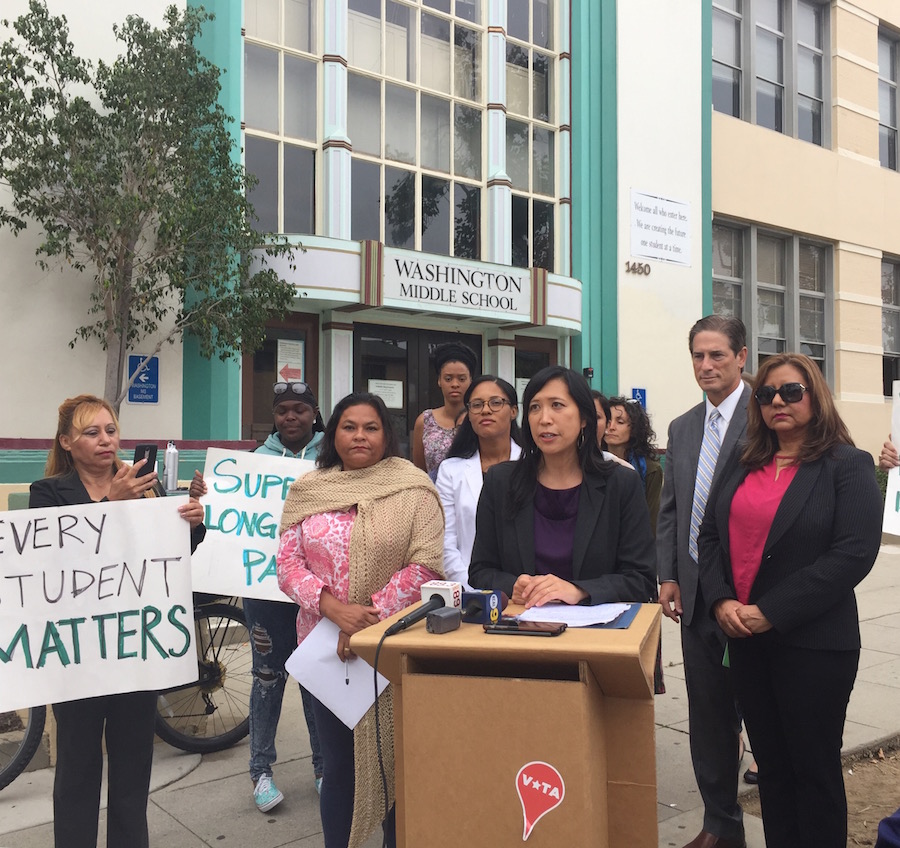
Public Advocates senior attorney Angelica Jongco and residents announcing their appeal to the California Department of Education outside Washington Middle School last month. Photo: Jason Ruiz
The Los Angeles County Office of Education (LACOE) has ruled that the Long Beach Unified School District (LBUSD) inappropriately allocated $24 million in funds meant to benefit high-needs students by applying the funding to buy textbooks and other common core materials that affect the district’s population as a whole.
In a release put out today, attorneys and community groups representing the complainants in the suit filed in June last year praised the findings by the county just over one month after they gathered outside Washington Middle School to announce they would appeal to the county and the California Department of Education that the district’s budget was not in compliance with state law.
“Finally, Long Beach Unified is being held accountable to fully meet its obligation to help high-need students,” said Martina Roman Sanchez, a parent complainant and member of Latinos in Action-California, one of the groups challenging the district’s budget. “We look forward to working with the district to identify the millions of dollars of new services that will benefit our students.”
Under a California law enacted in 2013 school districts receive additional funding through the Local Control Funding Formula (LCFF) for students who are classified as disadvantaged or high needs, which includes low income, English-learner and students from foster homes. Every three years, the district passes a new budget known as the Local Control and Accountability Plan (LCAP) which outlines how these funds, and other sources of revenue, will be deployed to service students.
The complaint filed by Public Advocates and the Children’s Defense Fund alleges that LBUSD spent $24 million of LCFF funds in its 2016-2019 LCAP outline.
Of the $24 million, the district had allocated $17 million for textbooks and materials and $7 million in teacher salary costs. The district has contended that because such a high proportion of its students fall into the categories for which it receives additional LCFF funding, spending money on what parents and their attorneys have characterized as inappropriate expenses, is the right thing to do.
LBUSD Director of Public Information Chris Eftychiou stood firm on the district’s previous position. He told the Post that LBUSD’s LCAP “meets or exceeds” state requirements and the spirit of the law, adding that the state’s department of education’s release of student achievement numbers today will show significant growth for Long Beach students in both math and English. Those numbers showed small improvements for the district with 48 percent (up 3 percent from 2016) of its students meeting or exceeding English and 39 percent (up 5 percent from 2016) of its students meeting or exceeding standards in math.
“Many of our schools closed achievement gaps by 50 percent or more,” Eftychiou wrote in an email. “In many ways, our school district is outperforming the state and other large, urban school systems. We fundamentally disagree with the ruling, and there are additional procedures ahead where we can correct the county’s error.
Leading education experts are saying that our methods should be emulated, and that county and state offices should learn from successful school districts like ours.”
However, the county saw things differently.
In its response to the complaint filed last month, LACOE said that the district could not provide a satisfactory explanation for its use of $17 million for common core-aligned textbooks and $7 million in teacher salaries. This is the first time that a COE has issued such a finding.
LACOE found that the district’s spending on textbooks could not be demonstrated to have targeted benefits “beyond the standards-aligned instructional materials required through Williams legislation”, a class-action lawsuit settled in 2004 that required equal access to instructional materials.
In challenging LBUSD’s contention that the $7 million in teacher salaries would help retain and recruit high-quality instructors, LACOE pointed to a recent determination involving the Fresno County Office of Education in which State Superintendent Tom Torlakson set a strict standard—demonstrably low salaries when compared to other districts—for which a district could use LCAP funds for teacher salaries.
“…the District did not meet this burden, and LACOE staff remains dubious that it could meet this burden given available salary and teacher retention data indicating the District’s strong position relative to other surrounding districts,” stated the county’s response.
RELATED
Long Beach Unified School District Accused of Misusing Funds Earmarked for Disadvantaged Students
It instructed LBUSD to discontinue claiming the totals for its LCAP going forward. The state’s department of education has yet to weigh in on the matter and a decision from the department could take several more months as it has requested more time to review the appeal. Earlier this month the Los Angeles Times reported that the department ruled that the Los Angeles Unified School District had misappropriated funds in a similar case and ordered over $150 million be redistributed to 50 schools in the city with some of its neediest students.
John Affeldt, a managing attorney at Public Advocates, said that while the history of LCFF challenges are relatively new with less than a dozen being filed since the new formula was implemented in 2013, this is a historic case as it’s the first time that a county has ruled against a district’s LCAP. Whether or not the California Department of Education will see things similarly is has yet to be determined, but there is some optimism that the two agencies will come to the same conclusion.
“We wouldn’t have filed the appeal if we didn’t think we were right,” Affeldt said. “This is just more wind in the sails of confirming that we’re right. That you can’t take a basic service like the textbook that every student uses and say one-hundred percent of the cost of that are principally directed toward high-needs students. It doesn’t make logical sense.”

